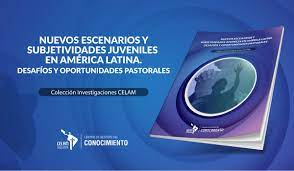New scenarios and youth subjectivities in Latin America

Pastoral challenges and opportunities
CELAM Knowledge Management Center
complete document :
While it is true that during the pandemic there was a shock of virtuality, it is also true that an accelerated process of digitalization of everyday experience was already taking place, reaching a global scale. The consequences for the constitution of post-pandemic subjectivities and the future of pre-pandemic institutions are still unpredictable, but they must be glimpsed and critically rethought in order to make decisions in the present.
The methodology used consists of the analysis of specialized bibliography produced in the field of youth anthropology and sociology in recent years in some countries considered referents on the subject (Argentina, Brazil, Chile, Colombia and Mexico). In turn, to understand the change of era, critical reading and appropriation of cultural studies and critical essays that appeared in the post-pandemic period are used.
It can be observed that it is a more hermeneutic than analytical approach, although the statistical production is not unknown, in the attempt to generate a picture of understanding of the current situation that contributes to interpret the reality of the new scenarios of culture, society current situation and the youth movement in these unprecedented and challenging scenarios for pastoral praxis. This text is based on a description of the digital age within the framework of multiple intersections between technical devices and rationalities (1)
Next, the constitution of subjectivities in hyper-connectivity is presented, but also in the inequality and disconnection that originates unprecedented forms of experience that challenge institutions.(2)
Within this framework, religious processes and the emergence of spiritualities are made explicit, not always linked to institutionalized religions. Beyond stereotyped and prejudiced perceptions about youth and their practices, I invite you to critically reflect on your own positions and open yourself up to understanding other ways of religious experience, sociability and relationships with the environment. (3)
Finally, I propose a version of the theoretical and practical movements of youth in this new cultural scenario. I believe that these displacements could serve to reposition oneself personally, community and institutionally in order to envision pastoral opportunities instead of trying to ward off or combat the historical novelty by closing ranks or entrenchment. (4)
8 Working Document “New cultures continue to take shape in these enormous human geographies in which the Christian is no longer usually a promoter or generator of meaning, but rather receives from them other languages, symbols, messages and paradigms that offer new life orientations, frequently in contrast to the Gospel of Jesus. An unprecedented culture beats and is elaborated in the city. The Synod has verified that today the transformations of these large areas and the culture they express are a privileged place for the new evangelization. This requires imagining spaces for prayer and communion with new characteristics, more attractive and meaningful for urban dwellers. Rural environments, due to the influence of the mass media, are not immune to these cultural transformations that also bring about significant changes in their ways of life”. (EG 73) “Put them in motion, in action. Today the youth ministry of groups and pure reflection no longer works. Youth ministry does not take root. You must set the youngster in motion: whether or not he is a practitioner, he must be set in motion. What I tell them is to get young people moving, invent things so that they feel like protagonists and so, later, they ask themselves: 'What's wrong, that changed my heart, why did I leave happy?' (...) If we put the young person in motion, we put him in a dynamic in which the Lord begins to speak to him and begins to move his heart.
We will not be the ones who are going to move the heart with our arguments, at most we will help it, with the mind, when the heart moves.”1 “(...) how to announce Jesus Christ to a changing generation”. 2 1 Pope Francis, “Conversations between the Pope and Colombian Jesuits”, Cartagena de Indias, September 28






